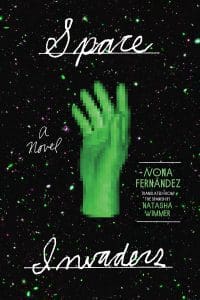To replicate child-like bewilderment rather than to simply retell it is an enviable feat—one that Nona Fernández masters in Space Invaders (88 pages; Graywolf Press; translated by Natasha Wimmer). Bordering on autofiction, the short novel calls upon Fernández’s childhood in Chilé in the ’80s during the turmoil surrounding dictator Pinochet’s unseating, and looks at how those times pervade the lives of the fifth-graders who center the story, and manifest in unexpected and devastating ways.
The young community faces police brutality and various other traumas, culminating in the disappearance of Estrella—a well-loved peer who vanishes without explanation. The story is primarily composed of various recollections of Estrella in the form of dreams and memories, while copies of her letters to her best friend Maldonado conjure her presence directly. Fernández’s narrator, a man named Zúñiga, relays stories of Estrella that continue to haunt his adult life as well as those of the others. These stories blur the line between fact and fiction, as Zúñiga tells us:
“If dreams and memories were truly different, we might be able to identify its source, but on our memoryless mattresses everything is mixed-up and the truth is that it doesn’t really matter anymore.”
Fernández’s effective and purposeful confusion of Estrella’s memory distills the narrator’s idea of the truth down to nothing but raw, subjective emotion. Some of the most memorable accounts of this collective’s childhood are obvious mutations of reality, mutations which might more accurately convey the heightened emotions the children experienced. The only person in the group to have ever visited Estrella’s home, Riquelme, has a terrifying dream of a “green, glow-in-the-dark hand,” inspired by Estrella’s father’s prosthetic hand and the classic video game Space Invaders that he played at her house. The hand, meant to resemble the bullets which erupt from the game’s laser cannons to kill the aliens, chases and obliterates Riquelme and his fellow “extraterrestrial children.”
Estrella’s father, who we see being tried in 1994 on the same television Riquelme played the video game on, turns out to have served an instrumental role in the murder of communist militants resisting Pinochet’s rule. It is the wooden hand that gives the man away. Fernández slowly and elegantly untangles the backdrop of the children’s lives in this final section, expressed through video games and school plays. It is only with Space Invaders that Riquelme and the rest are able to faintly grasp any reason for the senseless violence of Operation Condor as it quietly “disappears” their loved ones.
The chapter “Game Over” indexes the children’s individual experiences with the aftermath of injury, loss, and death. There are disappearances, funerals, beatings, anonymous threats, police searches—each of them having a profound and violent effect on both an individual and group level. Zúñiga concludes the chapter by reflecting on the fluid temporality shared by the victims of this cruelty:
“Time isn’t straightforward, it mixes everything up, shuffles the dead, merges them, separates them out again, advances backward, retreats in reverse, spins like a merry-go-round, like a tiny wheel in a laboratory cage, and traps us in funerals and marches and detentions, leaving us with no assurance of continuity or escape.”
As the children’s conceptions of the people and things they love, such as Estrella or Space Invaders, are skewed and made unrecognizable by political pretense, the guarantee of what the narrator labels “continuity or escape” is undermined.
Ruminating on the framework of the novel—portioned into “First Life,” “Second Life,” “Third Life,” and “Game Over”—it’s clear Fernández is relating her experience of Pinochet’s Chilé with the lifecycle of the player’s spaceship in Space Invaders. There is no ceiling to the high score; there is no cap to cruelty; there is no true end to that game; there is no escape from a scarring past. Space Invaders reveals how a child’s memory of a tragedy can accurately reflect the pain of the experience even when it does not necessarily reflect the truth.

